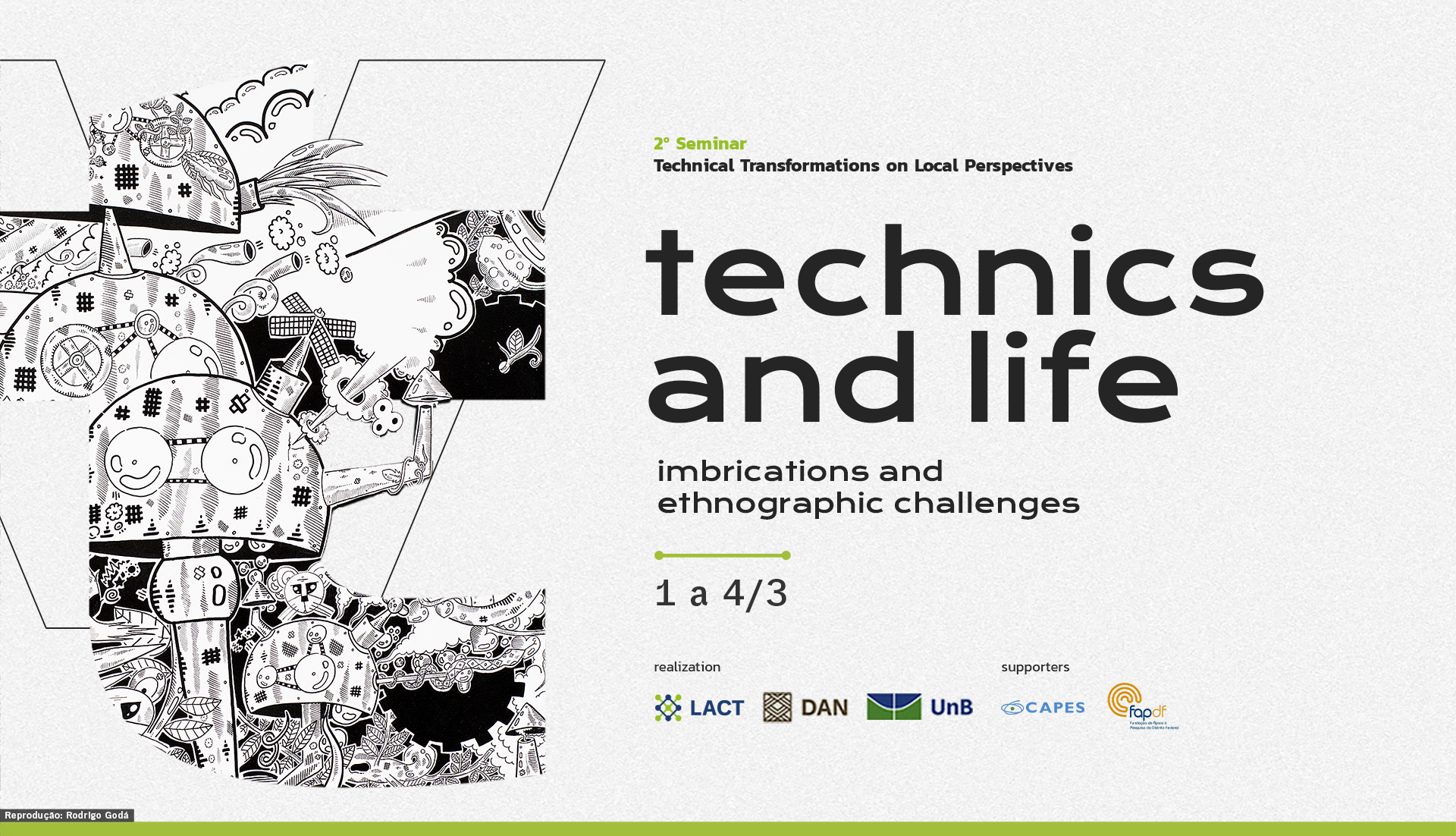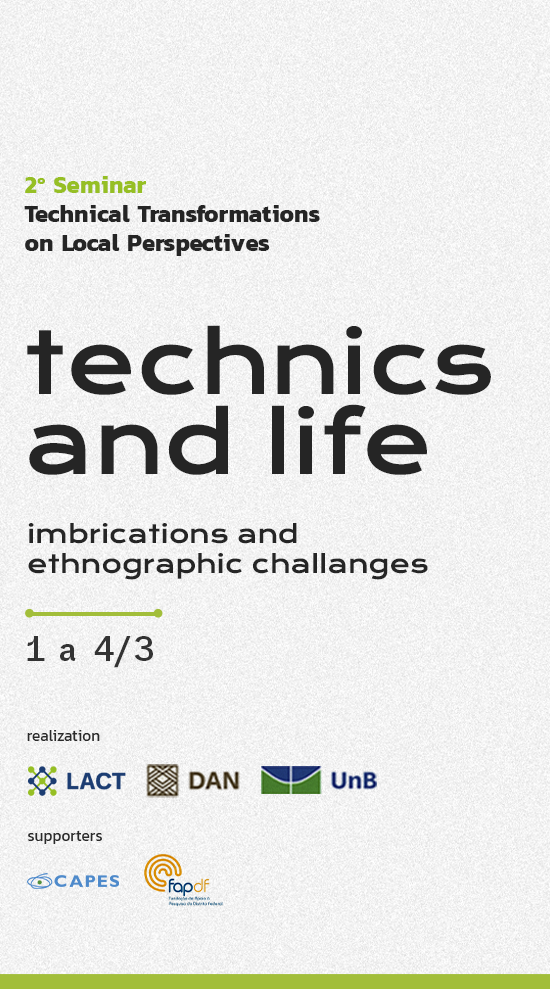

Presentation
What are the potential entanglements between technique and life in the contemporary world? How far are these related to the planet-wide transformations now taking place? How do these entanglements challenge our knowledge and our relationships to animals, plants and their environments? Participating in this urgent debate through anthropology entails two movements: a critical reflection on the premises subjacent to the ideas of life and technique, and an empirical openness to capturing new forms of existence and relation. We need to move away from an anthropocentric, instrumental and asymmetric concept of technique as technoscience, that is, as the application of human knowledge and intention onto nature. At the same time, it is essential to inquire into the living in terms of its operations and potentialities, placing in suspension a notion of life with pregiven limits and properties. Eschewing the fixation on products (objects or species) that result from the association between technodiversity (Hui 2020) and biodiversity, the challenge arises of how to refocus ethnographic attention on the processes or geneses of specific ecological configurations.
The conception of technique inspiring this seminar derives from anthropology (Mauss 2006, Sautchuk 2017) and distances itself from utilitarianism, emphasizing instead the relations between beings, environments and objects. This implies treating technique as a fact of life (Canguilhem 2000) – that is, as the varied and creative set of compatibilizations established by human and non-human organisms in association with their environment (Fagundes 2019). Setting out from this premise, the second edition of TRANSTEC will be open to new approaches to life as an emergent theme of recent anthropology. These range from semiotic proposals (Kohn 2013) to pragmatic approaches (Pitrou 2015, Coupaye 2017) and phenomenological alternatives (Ingold 2011), as well as sensory (Meyers 2019) and cinematographic explorations (Castro et al. 2020). Interrogating the interfaces between these anthropological fields, the seminar is organized around two correlated proposals. The first covers the relationship between technique and life as a thematic axis, while the second explores the methodological and analytic challenges represented by the imbrication of these processes in ethnography.
At a thematic level, the seminar convokes a debate between research projects dedicated to comprehending the entanglements between technical activities and vital processes in contemporary situations, organized around four axes: (1) plant life and its modes of action; (2) animal domestication as biotechnical emergence; (3) death and forms of life in hunting; and (4) spatial processes and ecological compatibilization. At a methodological level, the seminar seeks to sound out new frameworks for making anthropology in syntony with this theme. Hence, the challenge is to recalibrate ethnography’s sensitivity, recognizing that it also needs to be able to detect and compatible with specific ecological configurations that associate modes of action and vital processes. The diversity of potential responses to this need for compatibilization will allow us to discuss not only the learning dimension, common to many ethnographies, but also – and in particular – modalities of technical mediation or coordination (Sautchuk, 2012) between what we seek to perceive and how we perceive. Thus, the seminar will focus on the challenges, limits, specificities and, above all, innovations that emerge from these two movements, one thematic, the other methodological, linked to the ethnographic entanglements between technique and life and their contemporary transformations.
Bibliography
CANGUILHEM, G. 1965. 2000. “La question de l’écologie. La technique ou la vie,” lecture given in Strasbourg in 1973, published in the journal Dialogue, March 1974, pp. 37-44. In: F. Dagognet, Considérations sur l’idée de nature, Paris, Vrin, pp. 183-191.
COUPAYE, Ludovic. 2017. Cadeia operatória, transectos e teorias: algumas reflexões e sugestões sobre o percurso de um método clássico. Pp. 475-494 in Técnica e transformação: perspectivas antropológicas, edited by C. E. Sautchuk. Rio de Janeiro: ABA Publicações.
CASTRO, Teresa; PITROU, Perig; REBECCHI, Marie (eds.). 2020. Puissance du végétal et cinéma animiste – La vitalité révélée par la technique. Paris: Les Presses du réel.
DESCOLA, Philippe; G. PÁLSSON. 1996. Nature and society: anthropological perspectives. London: Routledge.
HUI, Y. 2020. Tecnodiversidade. São Paulo: Ubu.
INGOLD, T. 2011. Being alive: essays on movement, knowledge and description. London: Routledge.
KOHN, E. 2013. How forests think: toward an anthropology beyond the human. Berkeley: University of California Press.
FAGUNDES, Guilherme Moura. 2019. Fire normativities: environmental conservation and quilombola forms of life in the Brazilian savanna. Vibrant, v. 16, pp. 1-22.
MAUSS, Marcel. 2006. Techniques, Technology and Civilisation, edited by N. Schlanger. New York: Durkheim Press/Berghahn Books.
MYERS, Natasha. 2019. “From Edenic Apocalypse to Gardens against Eden: Plants and People in and after the Anthroposcene.” In Infrastructure, Environment and Life in the Anthropocene, edited by Kregg Hetherington, pp. 115–48. Durham, N.C.: Duke University Press.
PITROU, P. 2015. Life as a process of making in the Mixe Highlands (Oaxaca, Mexico): towards a ‘general pragmatics’ of life. Journal of the Royal Anthropological Institute 21 (1): 86– 105.
SAUTCHUK, C. 2012. Cine-Weapon: The Poiesis of Filming and Fishing. Vibrant 9(2): 406–430.
SAUTCHUK, C. (ed.) 2017. Técnica e transformação: perspectivas antropológicas. Rio de Janeiro: ABA Publicações.